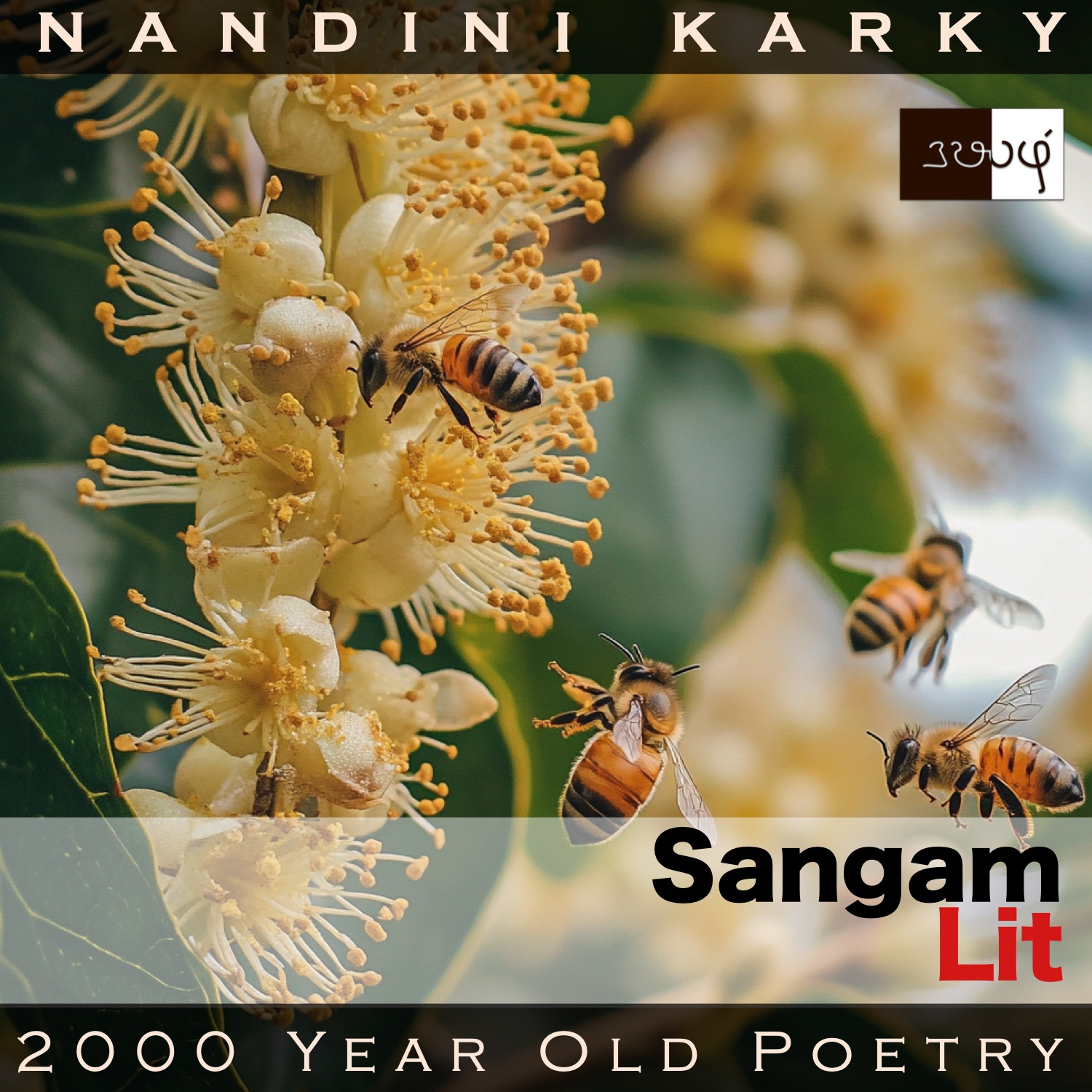Podcast: Play in new window | Download
Subscribe: Apple Podcasts | Spotify | Amazon Music | Android | iHeartRadio | TuneIn | RSS | More
In this episode, we observe how the passage of time was perceived, as depicted in Sangam Literary work, Kalithogai 35, penned by the Chera King Paalai Paadiya Perunkadunko. The verse is situated in the ‘Paalai’ or ‘Drylands landscape’ and narrates the changes in spring.

‘மடியிலான் செல்வம் போல் மரன் நந்த, அச் செல்வம்
படி உண்பார் நுகர்ச்சி போல் பல் சினை மிஞிறு ஆர்ப்ப;
மாயவள் மேனி போல் தளிர் ஈன, அம் மேனித்
தாய சுணங்கு போல் தளிர்மிசைத் தாது உக;
மலர் தாய பொழில் நண்ணி மணி நீர கயம் நிற்ப,
அலர் தாய துறை நண்ணி அயிர் வரித்து அறல் வார;
நனி எள்ளும் குயில் நோக்கி இனைபு உகு நெஞ்சத்தால்,
துறந்து உள்ளார் அவர்’ எனத் துனி கொள்ளல் எல்லா! நீ
‘வண்ண வண்டு இமிர்ந்து, ஆனா வையை வார் உயர் எக்கர்,
தண் அருவி நறு முல்லைத் தாது உண்ணும் பொழுதன்றோ
கண் நிலா நீர் மல்கக் கவவி, நாம் விடுத்தக்கால்,
ஒண்ணுதால்! நமக்கு அவர் “வருதும்” என்று உரைத்ததை?
மல்கிய துருத்தியுள் மகிழ் துணைப் புணர்ந்து, அவர்,
வில்லவன் விழவினுள் விளையாடும் பொழுதன்றோ
“வலன் ஆக, வினை!” என்று வணங்கி, நாம் விடுத்தக்கால்,
ஒளியிழாய்! நமக்கு அவர் “வருதும்” என்று உரைத்ததை?
நிலன் நாவில் திரிதரூஉம் நீள் மாடக் கூடலார்
புலன் நாவில் பிறந்த சொல் புதிது உண்ணும் பொழுது அன்றோ
பல நாடு நெஞ்சினேம் பரிந்து, நாம் விடுத்தக்கால்,
சுடரிழாய்! நமக்கு அவர் “வருதும்” என்று உரைத்ததை?
என ஆங்கு,
உள்ளுதொறு உடையும் நின் உயவு நோய்க்கு உயிர்ப்பாகி,
எள் அறு காதலர் இயைதந்தார் புள் இயல்
காமர் கடுந் திண் தேர்ப் பொருப்பன்
வாய்மை அன்ன வைகலொடு புணர்ந்தே.
The lady worries and the confidante consoles! The words can be translated as follows:
“Akin to the wealth of one who is never idle, trees flower; Akin to those who feed on that wealth, without any effort on their part, bees resound around many branches; Akin to the skin of a dark-skinned maiden, tender shoots shine; Akin to pallor spots on this skin, upon the leaves, pollen falls; Near the groves, blooming with flowers, stand sapphire-hued ponds, and near the banks, on which fallen flowers are scattered, weaving patterns on the sand, streams flow; Looking at the cuckoo that seems to be mocking a lot, with a heart full of angst, thinking about he, who has parted without a thought, don’t you be sorrowful, my friend!
‘Colourful bees resound and the unceasing Vaigai flows through tall sand dunes; It’s the time when fragrant jasmines by cool cascades are feasted upon for their pollen. Back then, as tears flowed beyond the control of my eyes, when I bid farewell to him, O maiden with a shining forehead, wasn’t this the time he said he would return?
Embracing one’s pleasant companion on a little river island, it’s the time to play and rejoice in the ‘Villavan festival’. Back then, when wishing that his mission be successful, when I bid farewell to him, O maiden wearing shining jewels, wasn’t this the time he said he would return?
In Koodal, filled with tall mansions, it’s the time when people savour the new and good words born from the tongues of poets. Back then, as my heart thought about many things, when I bid farewell to him, O maiden wearing radiant ornaments, wasn’t this the time he said he would return?
And so, saying all this, you lament whenever you think about the past. As the cure of this love affliction in you, with the truth of that king, who has an alluring sturdy chariot with the speed of a bird, your faultless lover is about to return on the promised day!”
Let’s explore the details. The verse is situated in the context of the man’s parting from the lady after marriage and starts in the voice of the confidante, expresses thoughts of the lady, and once again, concludes with the words of the confidante. In the first section, the changes in spring are highlighted, such as the flowering of trees, which are placed in parallel to the wealth of those who know not the meaning of laziness. Next, the image of bees buzzing around these flowers is placed in parallel to people who enjoy that wealth of others, with no hard work on their part; The bees are getting bad publicity because of this simile! Moving on, the richness of the leaves is equated to the dark skin of maiden and the pollen falling on the same to the pallor spots on the dark skin. You also get to see ponds and banks scattered with flowers, in spring!
Describing all this, the confidante requests the lady not to feel sad every time she hears the cuckoo sing, thinking about the man who parted away. Just then, the lady conveys her point of view by mentioning how it was the time when the Vaigai flows with gusto, the time of the Villavan festival, when lovers are meant to be together, and also, the time in Koodal, when poets come together to pen new verses to delight the people there. Then, she thinks back to the past and asks her friend, when I bid bye to the man, with my eyes shedding tears beyond my control, as I wished him success, and as my heart thought of so many things, didn’t he promise to be back by now? The confidante replies to this angst-ridden question by telling her just like a king, who was renowned for his bird-like chariot and the truth of his words, the man was sure to keep his word and would return before the promised day.
The most interesting element that can be extracted from this verse is the mention of poets penning verses, a sort of self tagging, in the city of Koodal, which is also known by the name of ‘Madurai’. Apparently, this happens in the season of spring. This reminds of many a character from the novels of P.G.Wodehouse, who wax poetic about this very season in the cold corners of England. Perhaps these poets, across space and time, universally felt that spring was the perfect time to pen and share their verses, when new things bloom and love was surely in the air!




Share your thoughts...